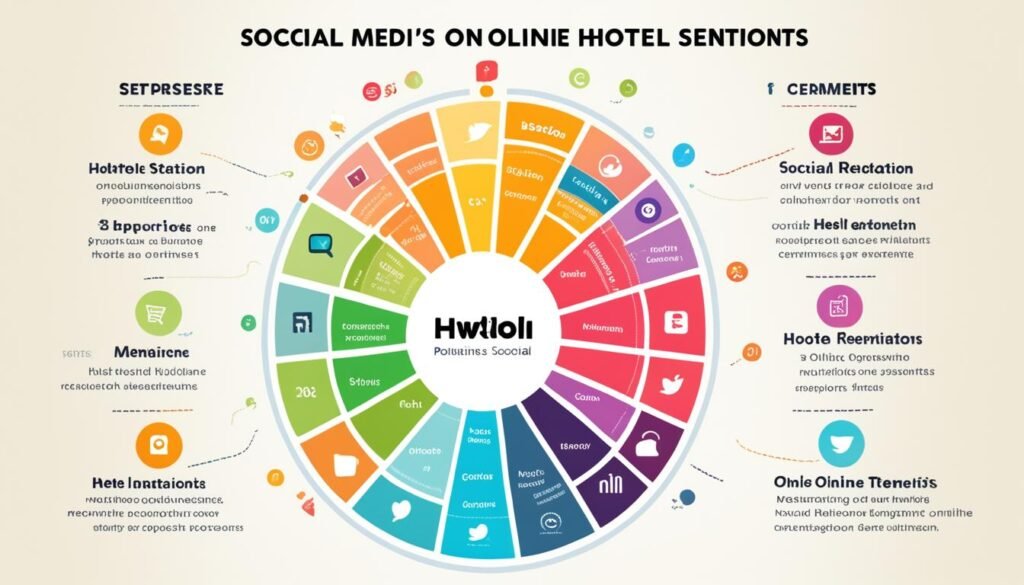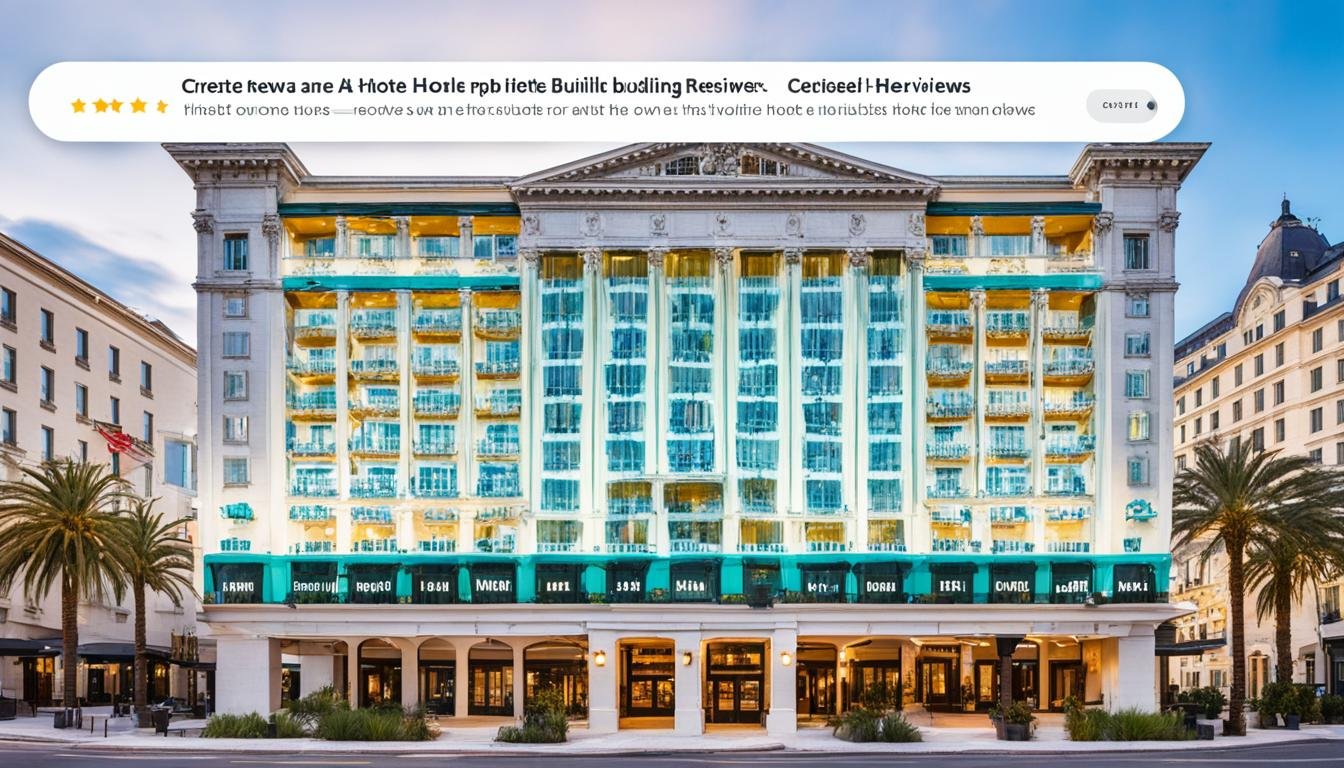Mastering Online Reputation in Hospitality Sector
Online reputation is key for hotels today. It affects how we see a hotel and its income. So, it’s vital for hotel owners to keep their webpage positive.
Let me tell you a story to show why managing your online image matters.
Emma runs a cool boutique hotel in a busy city. The place is beautiful, with great staff. Emma works hard to make sure everyone has a wonderful time.
She saw their bookings dropping and checked why. It was all because of a bad review. A visitor said the room was dirty and some things were broken.
Emma knew she had to act fast to save her hotel’s name. She answered the review, said sorry, and promised to fix things quickly.
Her response impressed future guests. They saw the hotel was serious about fixing issues. Plus, they read other great reviews. These praised the quick help and how clean the hotel was.
Slowly, the bad review didn’t matter as much. Good reviews took over, and the hotel got busy again. This showed how tackling bad reviews can help a lot.
This story underlines why managing your online reputation is a big deal. Being quick and positive can make unhappy visitors come back. And it makes the hotel look great to new visitors.
Key Takeaways:
- For hotels, online reputation is everything.
- Responding well to bad reviews can lessen their harm.
- Good reviews and fast help can win over more guests.
- A smart online image management plan can increase visitors and money.
- Keeping an eye on what people say online and talking to visitors is crucial for a good image.
What Is Hotel Reputation Management?
Hotel Reputation Management is the act of creating and upkeeping a positive view of a hotel among people. It deals with handling bad reviews and ensuring all the hotel’s content is true to its brand. Hotel owners work on making their business or brand more visible to the right crowd. ORM watches and shapes how a hotel is seen on the web. This involves checking review sites, being active on social media, and making the hotel’s website more searchable. It lets hotels connect with customers, win their trust, look good online, and affect their choice to book.
It’s super important in the hospitality world. Doing it well helps hotels control their online image in a good way. With a good reputation, hotels bring in more people and make more money.
“A good online image is key for hotels. It’s more than just handling bad reviews. ORM makes sure the hotel’s online content matches its actual brand. This includes checking reviews, using social media, and improving search results. These efforts help hotels talk to their customers, build a strong online home, and influence booking choices.”
In today’s digital world, how hotels look online matters a lot. It really influences what people think and whether they’ll book. Managing a hotel’s online reputation involves many strategies. They’re all about keeping a positive image and talking well with customers.
Hotel Reputation Management is a big deal in the industry. It’s part of making people trust the hotel, creating a strong online image, and capturing the right audience. With smart reputation management, hotels can stand out, lead in their field, and do better overall.
| Benefits of Hotel Reputation Management |
|---|
| 1. Enhances online visibility and exposure |
| 2. Builds positive relationships with potential guests |
| 3. Influences booking decisions |
| 4. Improves search engine rankings |
| 5. Provides valuable data for business growth |
What Does Reputation Management Include?
Reputation Management focuses on how a hotel’s online image is seen. It includes checking the reputation, fixing bad online posts, and making a good name online.
Reputation monitoring is very essential. It means regularly checking how the hotel is seen on social media. Hotels can learn a lot by looking at what people say online. This helps them keep a positive image on the internet.
Reputation repairing is about handling bad comments online. Hotels need to address these issues to win back trust. By solving complaints or dealing with bad reviews, they work to improve how they’re seen.
Reputation building is all about creating good stories and experiences. This strategy focuses on making the hotel look good online. It involves talking to customers on social media, encouraging good reviews, and improving the website for search engines. Doing this well can bring more people to the website and boost the hotel’s online standing.
Using online reputation management software can be part of the process, helping hotels better handle their online image. This kind of software makes it easier to keep track of the hotel’s reputation.
Reputation Management includes monitoring, fixing bad posts, building a good name, and using special software. Hotels do this to keep a positive image online. This way, they can draw in more guests and keep up with their competition.
Why Reputation Management Matters
For hotels, a good online reputation is vital in the digital era. It affects what customers think and if they choose to book a stay. Next, we’ll look more into why managing a hotel’s reputation is key in the hospitality business.
Why Is Hotel Reputation Important?
Hotel Reputation Management is vital for standing out and succeeding in the hospitality world. A good online reputation helps hotels rank higher in searches. This makes them more likely to be chosen by people looking for places to stay. It also gives valuable insights into what customers like and want, helping hotels grow. The way a hotel is seen online affects how many rooms it sells and how much money it makes. Plus, keeping customers happy and fixing any issues quickly can boost a hotel’s image and bottom line.
The Impact of Hotel Reputation
“A good reputation is more valuable than money.” – Publilius Syrus
A hotel’s reputation is key to its success. It shapes how much money it earns and how top players view it. A positive standing boosts search results, social media power, and the number of reviews. All these factors bring more business through the door.
Financial Performance and Sales
Good reviews can lead to more money for a hotel. They draw in more visitors and bump up the number of bookings. This trust in a positive track record helps the hotel win over more guests. Reviews are especially important online. Nearly all people check them before choosing a hotel. Without reviews or with bad ones, attracting guests is tough. But hotels with shining online reputations can see their rooms filled and their earnings soar.
Search Engine Rankings and Visibility
Being at the top of search results is a big deal for hotels. A strong online reputation can push them up there, making them more likely to be seen by travelers. This visibility can lead to more website visits and higher bookings, boosting the hotel’s bottom line.
Social Media Influence
Nowadays, social media is a big part of how hotels are seen. It’s not just about review sites. These platforms let guests share their stories and pictures. A good presence on social media can better a hotel’s brand and draw in new fans. It’s a way to connect with people, build loyalty, and reinforce the hotel’s image.
Online Reviews and Customer Perception
Reviews online say a lot about a hotel. Good ones pull more guests and help the hotel look good. But bad ones can send people elsewhere. Handling online reviews well, and listening to and fixing issues, can improve how guests see the hotel. This is critical for keeping a positive image.
Online Reviews Statistics
Here are some stats to show why keeping a good reputation online is crucial:
- 93% of people consider online reviews when booking a hotel
- 52% would never book a hotel with zero reviews
- 88% won’t consider hotels with a star rating of less than three
These numbers underscore the influence of online reviews on booking decisions. They also highlight the necessity of a strong reputation in the hotel business.
What Is Likely To Bring You Bad Reputation?
Managing a hotel’s reputation well is hard. Many things can make people think poorly of your hotel. A single unhappy guest can damage your entire business’s name. So it’s important for hotels to be well-liked online and to give great service. Every step, from booking to after their stay, affects how guests see your hotel.
Bad things happening at your hotel can hurt you. If there are photos or videos online showing issues with rooms, your reputation might take a big hit. In today’s world, social media can spread a bad review fast, changing how people see your business.
“Maintaining a strong online presence and providing exceptional guest experiences are crucial for enhancing and preserving the hotel’s brand image.”
So, hotels need to keep guests happy and solve problems quickly. Training your staff to deal with complaints well can lessen the effect of bad incidents. Also, watching and responding to your online reviews can help keep a good image with future guests.
| Factors Affecting Reputation | Description |
|---|---|
| Customer Perception | The way guests perceive your hotel based on their experiences and interactions. |
| Online Presence | How visible and engaging your hotel is online, including website, social media, and review platforms. |
| Guest Behavior | The actions and behaviors of your guests during their stay, including how they treat staff, fellow guests, and the property itself. |
| Brand Image | The overall perception and reputation of your hotel’s brand, encompassing its values, identity, and promises to guests. |
Managing these things well and making guests happy can stop a bad reputation. Always remember, every interaction with a guest is a chance to leave a good impression. This builds a strong brand image.
How Does Reputation Management Help Boost Room Sales Of A Hotel?
A good reputation affects a hotel’s room sales directly. Today, managing online reputation is key for attracting customers. Travelers often choose hotels based on online reviews and ratings.
It’s vital for hotels to have a positive online image. Such an image can boost how customers see them and influence their booking choices. An outstanding online reputation helps a hotel attract more guests and sell more rooms.
Reputation management lets hotels shape a better online image. They can respond to feedback, solve problems, and make guests happier. This strategy shows the hotel values customer service and wants to provide the best experience.
“A higher rating on review sites like TripAdvisor significantly influences customers’ choice.”
Also, a good reputation means search engines are more likely to show the hotel in top results. This brings more traffic and potential guests. Improved visibility ultimately increases the chances of getting bookings.
Plus, a positive online image boosts a hotel’s social media appeal. Good reviews create excitement and interaction on social platforms. Engaging with guests online can make a hotel stand out and attract more business.
In short, managing reputation well is crucial for hotels. It helps them secure more bookings and keep a steady income. By working on their reputation, hotels win trust and perform better in the tough competition of the hospitality sector.
How Is Online Reputation Management for Hotels Measured?

Managing an online brand is key for hotels to stay well-liked. But what’s the best way to know if their strategies work? We’ll look at how they can tell if customers are happy online.
Net Promoter Score (NPS)
The Net Promoter Score (NPS) is a key method for this. It looks at how customers rate the hotel. The scores split customers into promoters, passives, and detractors.
Promoters really like the hotel and tell others to stay there. Detractors, however, aren’t happy and might leave bad reviews.
Through NPS, hotels learn what guests really think. This helps them find what they’re doing right and what needs to get better.
Natural Language Processing (NLP)
Natural Language Processing (NLP) is also very helpful. It uses AI to understand reviews. By detecting the tone in these reviews, it can say whether customers sound happy or not.
If a lot of reviews sound negative, the hotel knows what to work on. But if comments are positive, they know they’re doing something right.
This AI helps hotels to see what their guests think in a way that’s clear and easy to understand. It then guides their decisions to keep online reviews shining.
NPS and NLP give real insights into what customers say and feel. With this knowledge, hotels can boost satisfaction and keep a good image online.
How to Track Your Hotel Reputation
It’s crucial to follow your hotel’s reputation to see how customers view it. This helps you spot what people like or don’t like about your place. Tracking what’s said online lets you make smart moves to better your reputation.
Monitoring Online Reviews and Ratings
Keeping an eye on online reviews and ratings is key. They give insights into what guests think and help you handle issues. By checking review websites and travel portals often, you can keep your reputation strong.
Analyzing Customer Sentiment
Looking into customer feelings is important. Use tools to understand what people are saying in their reviews and on social media. This info can show you where to improve so guests are happier.
Engaging on Social Media Platforms
Being active on social media matters a lot. Join conversations and reply to feedback. Doing this well boosts trust and shows you care about your guests.
Utilizing Website Analytics
Website analytics help you see how visitors use your site. Understanding this behavior can guide you to better your site. This can improve your reputation and lead more people to book with you.
Monitoring Brand Reputation Metrics
Keep track of important reputation measurements. These include your review number, the average rating, and social media stats. Watching these helps you know how well you’re doing and where to improve.
By using these steps to watch your hotel’s reputation, you can grow your business and make customers happy.
Online Reputation Management for Hotels: Key Pointers for Tracking
Hotels must focus on key areas to track their reputation well. This helps them know what people say online. They can then act to better their impression.
Monitoring Online Reviews and Ratings
Keeping an eye on reviews and ratings helps understand what guests think. Reviews give insights into good and bad experiences. Hotels can improve by checking feedback and responding to it.
Social Media Engagement
Being active on social media helps hotels connect with customers. They can share good stories, answer questions, and fix issues publicly. This builds trust and loyalty.
Tracking Website Visits
By tracking website visits, hotels learn about customer likes and dislikes. They can see what pages are popular and make their site better. Understanding visitor behavior is key to improving online reputation.
Utilizing Reputation Management Tools
Reputation management tools can make tracking easier. They offer data and insights into how the hotel is perceived. This way, hotels can spot trends and areas needing work.
These strategies will help hotels track and improve their reputation. A good reputation attracts more guests and beats the competition. It’s crucial in the hospitality business.
Utilizing Guest Satisfaction Surveys for Better Customer Experience
Guest satisfaction surveys are a key tool for hotels to improve customer experience. These surveys help hotels get direct feedback from guests. This feedback gives them real insight and shows them where they need to improve.
Hotels use these surveys to learn about their guests’ experiences. They can see what guests liked and what they didn’t. This helps them tailor their services to meet guest expectations.
Through surveys, hotels can make smarter decisions to better serve their guests. They use the feedback to improve services and to make sure any issues are dealt with. This can lead to a better overall experience for guests.
“Guest satisfaction surveys are a powerful tool for hotels to understand their guests and continually improve their offerings.”
Insights from these surveys help build stronger bonds with guests. Hotels can use the info to communicate better and offer personalized advice. This shows the hotel really cares about making guests happy.
Also, surveys let hotels catch and fix problems early. By listening to feedback and acting fast, they can avoid bad public reviews. This helps keep their online reputation positive.
The data from surveys can be studied to find trends and new ways to improve. This analysis can provide deep insights for a better guest experience. Techniques like sentiment analysis can be quite powerful.
Benefits of Guest Satisfaction Surveys:
- Gather direct feedback from guests
- Identify areas for improvement
- Understand customer preferences and behavior
- Enhance overall guest experience
- Personalize guest interactions
- Mitigate negative reviews
- Drive data-informed decision-making
To sum up, guest satisfaction surveys are a big help in hospitality. Hotels can learn a lot from them and make changes for the better. This leads to happier guests and a good reputation online.
Conclusion
In the hospitality world, managing how your hotel looks online is key to success. Hotels improve by handling what people say, acting on feedback, and keeping their online spot nice. They also use tools to help with this task.
Your hotel’s online face affects how many people stay there and come back. It also shows other industry folk and customers what you’re like. To do well, you should make sure people say good things and talk to customers.
Today, being good online is as important as the hotel itself. Working hard to look good online helps beat industry obstacles. It also makes you stand out and keep customers happy.
FAQ
Q: What is managing online reputation in the hospitality sector?
A: In the hospitality sector, managing online reputation is key. It’s about making sure people see your hotel in a good light. This involves keeping an eye on what people say, responding to feedback, and making sure your online presence shines.
Q: What is hotel reputation management?
A: Hotel reputation management is all about keeping a positive image of the hotel. This means dealing with bad reviews, ensuring your brand is true, and talking to your guests.
Q: What does reputation management include?
A: It’s about watching your reputation, fixing anything negative, and building a good name. This includes using special software to help.
Q: Why is hotel reputation important?
A: A hotel’s good name is vital. It affects how people see the hotel and how much money it makes. It also plays a big part in where the hotel shows up online, how it does on social media, and if people choose to stay there.
Q: What is likely to bring you a bad reputation?
A: Getting bad reviews, having a weak online presence, and any damaging incidents can hurt your image.
Q: How does reputation management help boost room sales of a hotel?
A: Managing your reputation online can make a big difference. It can make your hotel more visible, bring in more guests, and earn more money. This is because it shapes how people think of your hotel, how it shows up online, and whether guests choose to stay with you.
Q: How is online reputation management for hotels measured?
A: To measure a hotel’s online reputation, we use things like Net Promoter Score and Natural Language Processing. Net Promoter Score looks at customer ratings, while Natural Language Processing checks what customers say in their reviews.
Q: How to track your hotel reputation?
A: Keeping track of your hotel’s reputation means watching reviews and ratings, understanding what customers think, being active on social media, and using website data.
Q: What are the key pointers for tracking hotel reputation?
A: The main things to focus on are checking reviews and responding, talking with customers online, and looking at your website data. This shows you what your customers like and what they don’t.
Q: How can guest satisfaction surveys improve customer experience?
A: These surveys can really help. They give you feedback that shows where you can do better, what your guests like, and how to make them happy so they come back.
Q: Why is online reputation management important in the hospitality industry?
A: For hotels, managing their online image is a big deal. It helps them bring in new guests, keep the guests they have, look good in the industry, and make more money.







